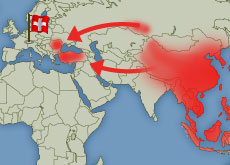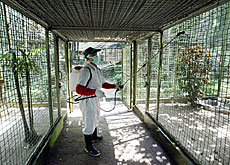Swiss ban Turkish and Romanian poultry imports

The Swiss authorities have suspended imports of poultry from Turkey and Romania as a preventive measure against the spread of avian flu.
But health officials say there is no reason for panic over a virus, the impact of which on humans is still unclear.
The Federal Health Office said on Monday that the situation remained unchanged and that the animal-virus strain A H5N1 only affected humans in rare cases.
But bird flu is approaching and after affecting 12 Asian countries, Kazakhstan and Russia, it has now reached Turkey and possibly Romania.
Following the example of other countries, the Federal Veterinary Office has banned imports from these two countries while waiting for information on whether the birds were victims of the most dangerous of the bird flu viruses.
Only supposition
The secretary-general of the Swiss Pharmacists’ Association, Marcel Mesnil, told swissinfo that the threat was still only a supposition.
“What we fear is that a human virus combines with that of the bird flu to produce one that can be transmitted from one person to another.”
The Federal Health Office is recommending a flu vaccination for poultry farmers, the chronically ill and medical staff.
Mesnil said that if one day the H5N1 strain were to combine with the human flu virus, it would be possible for humans to produce enough antibodies against the flu side of the virus to eliminate it.
He based this on the example of the Spanish influenza pandemic which caused the deaths of 50 million people in 1918 and 1919.
“They were mainly young people who had not had contact with a similar virus, whereas older people were protected,” he said.
Switzerland prepares
Switzerland is preparing for a possible pandemic and has built up a stock of a drug that can treat up to 25 per cent of the population.
The drug in question is called Tamiflu, produced by the Roche pharmaceutical group of Basel.
“It can slow down the multiplication of known viruses, which gives patients more chances to develop antibodies,” explained Mesnil.
But he said that it served no purpose to build up stockpiles of an expensive drug – a package costs SFr80 ($62.23) – if it was not known whether it would work.
Tamiflu is still a prescription drug because it can have undesirable side effects. The Federal Health Office considers it a preferred drug, but Mesnil says there are other anti-viral drugs.
No vaccine
Tamiflu is not a vaccine. A vaccine does not exist because the possible future virus is not known, Mesnil explained.
The health office has made it clear that people can eat chicken without risk because all viruses are killed when the cooking temperature reaches 70 degrees Celsius.
For the time being, the arrival of bird flu in Switzerland would above all be an economic catastrophe because all poultry stocks would have to be destroyed.
swissinfo, Isabelle Eichenberger
Appearing in South Korea in 2003 after a first alert in Hong Kong had been controlled in 1997, avian flu has been detected in birds in Turkey and possibly Romania. It has also spread to 12 Asian countries, Kazakhstan and Russia.
Fifteen subtypes of influenza virus are known to affect birds. To date all outbreaks of the highly pathogenic form have been caused by influenza A viruses of subtypes H5 and H7.
Since the end of 2003, bird flu has caused 65 deaths in Asia, mostly people who have come into contact with birds.
The World Health Organization in Geneva estimates that a pandemic could cause between 2 and 7.4 million deaths.
The government has suspended imports of poultry from Romania and Turkey as a measure to fight the spread of avian flu.
The animal-flu virus A H5N1 does not affect human beings but a flu vaccination is being recommended for poultry breeders, chronically sick people and medical staff.
Bern is to spend SFr4.8 million on a programme to screen migratory birds from the east for the H5N1 virus.

In compliance with the JTI standards
More: SWI swissinfo.ch certified by the Journalism Trust Initiative



You can find an overview of ongoing debates with our journalists here . Please join us!
If you want to start a conversation about a topic raised in this article or want to report factual errors, email us at english@swissinfo.ch.